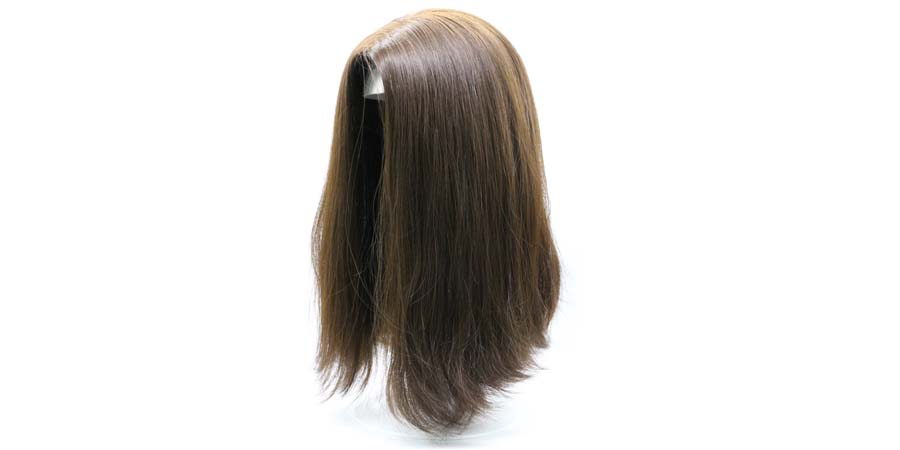The market for Jewish wigs, also known as sheitels, has seen significant growth and transformation over the years. These wigs, traditionally worn by married Orthodox Jewish women as a symbol of modesty, have evolved in both quality and variety, driven by increasing demand for natural-looking and comfortable hairpieces. This blog explores the current state of the Jewish wigs market, including key trends, top-performing brands, and the driving forces behind the industry's expansion.

The Evolution of Jewish Wigs
Historically, Jewish wigs were simpler in design and construction, often made from synthetic fibers that did not always offer the most natural appearance. Over time, as technology advanced and consumer expectations grew, the market began shifting towards higher-quality wigs made from human hair and featuring innovative construction techniques. This change was driven by the desire for more realistic wigs that not only comply with religious customs but also allow women to feel confident and stylish.
Today, the market offers a wide range of options, with wigs categorized primarily into three types: Silk Top Wigs, Mono Top Wigs, and Lace Wigs. Each type has its unique features, catering to different preferences and needs.
-
Silk Top Wigs
-
These wigs feature a silk top that mimics the natural scalp, making the hairline and parting look extremely realistic. Silk top wigs are known for their superior quality and are often considered the most premium option in the market.
-
Mono Top Wigs
-
Mono top wigs use a monofilament cap that allows hair to be parted in any direction, giving the wearer the flexibility to style the wig as desired. The monofilament material is breathable and lightweight, making these wigs a popular choice for daily wear.
-
Lace Wigs
-
This category includes several sub-types, such as Full Lace Wigs, Lace Front Wigs, and Lace Wigs with Silk Top. Lace wigs are highly valued for their natural hairline and versatility in styling. Full lace wigs offer the most flexibility, while lace front wigs provide a balance between natural appearance and affordability. Lace wigs with a silk top combine the benefits of both, offering a realistic scalp and a natural hairline.
Key Market Trends
The Jewish wigs market has been influenced by several key trends in recent years:
-
Increased Demand for Customization
-
As more women seek wigs that perfectly match their natural hair and personal style, customization has become a major trend. Brands that offer custom-made wigs tailored to individual specifications are gaining popularity.
-
Innovation in Wig Construction
-
Advancements in wig-making technology have led to the development of more comfortable and natural-looking wigs. This includes the use of hand-tied caps, advanced lace materials, and breathable monofilament tops.
-
Rise of Online Retail
-
The growth of e-commerce has made it easier for women to access high-quality wigs from around the world. Many leading brands now offer extensive online catalogs, allowing customers to browse and purchase wigs from the comfort of their homes.
-
Focus on Sustainability
-
As consumers become more environmentally conscious, there is a growing demand for ethically sourced human hair and sustainable wig production practices. Some brands are responding by offering wigs made from ethically obtained hair and using eco-friendly packaging.
Top Brands in the Jewish Wigs Market
Several brands have established themselves as leaders in the Jewish wigs market, known for their quality, innovation, and customer service. Here are some of the top-performing brands:
-
Freeda Wigs
-
A well-known brand that offers a wide range of high-quality human hair wigs. Freeda Wigs is particularly popular for its natural-looking silk top wigs and commitment to using only the finest materials.
-
Shevy Wigs
-
Shevy is another top brand, known for its luxurious wigs made from premium European hair. The brand offers a variety of styles, including lace front wigs and custom-made options.
-
Chani Wigs
-
Chani Wigs is recognized for its attention to detail and customer-focused approach. The brand offers bespoke wigs that are tailored to the exact preferences of the wearer, ensuring a perfect fit and natural look.
-
Sheitel Mavens
-
Known for its extensive range of wigs and excellent customer service, Sheitel Mavens is a go-to brand for many Orthodox Jewish women. The brand offers both ready-made and custom wigs, with an emphasis on quality and durability.
The Jewish wigs market is dynamic and growing, with increasing demand for high-quality, natural-looking, and customizable options. As the industry continues to evolve, brands that prioritize innovation, customer satisfaction, and sustainability are likely to maintain their leadership positions. For women seeking the perfect wig, the current market offers an unprecedented range of choices, making it easier than ever to find a wig that meets both religious and personal style requirements.

